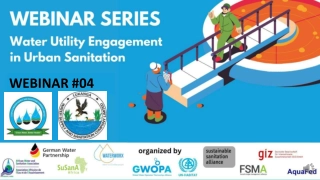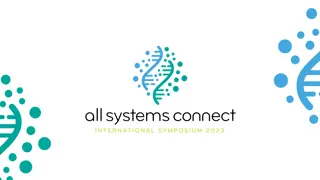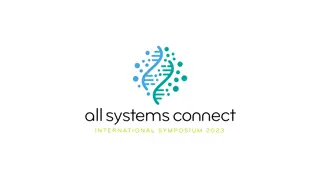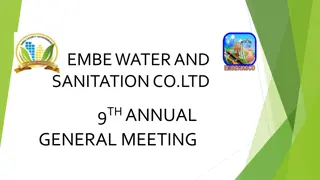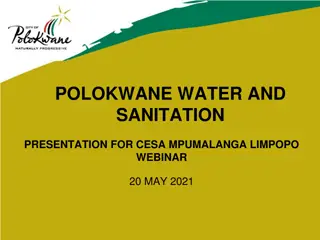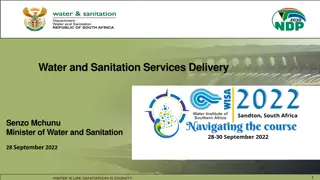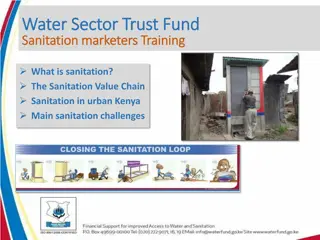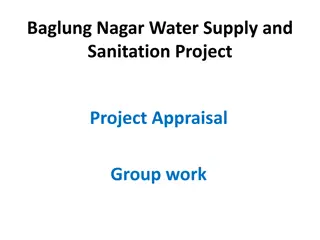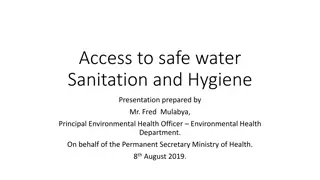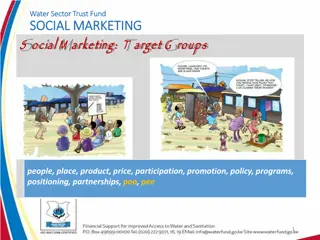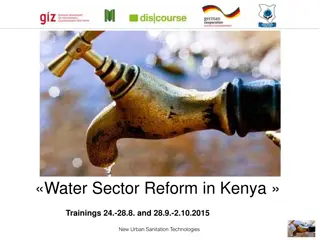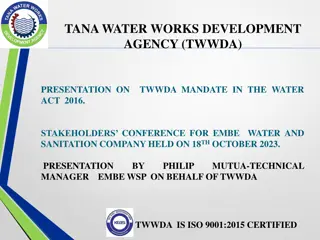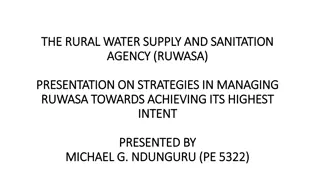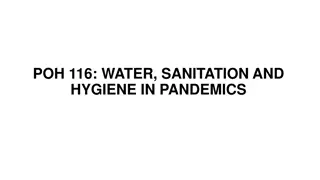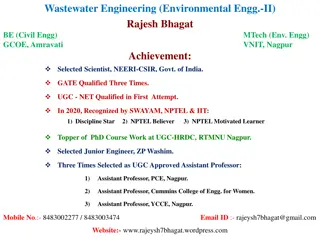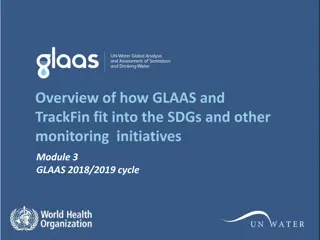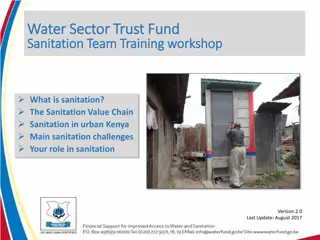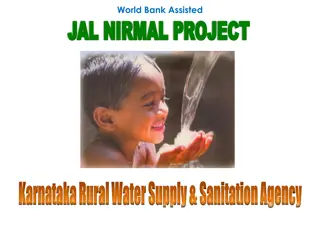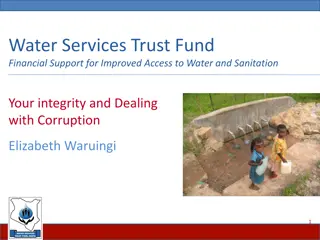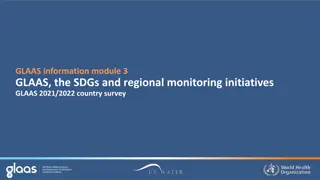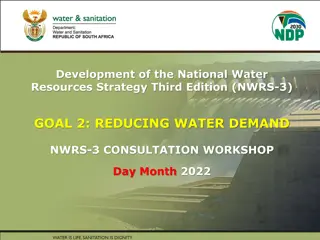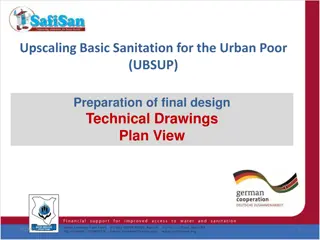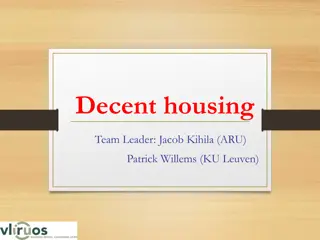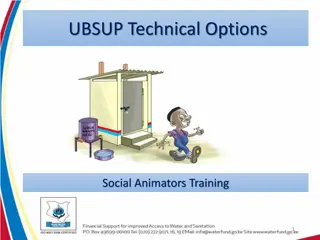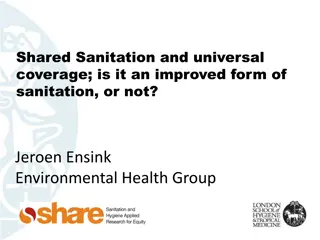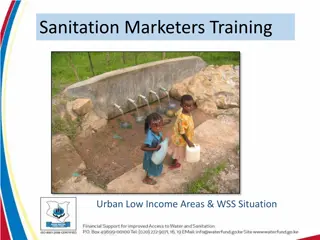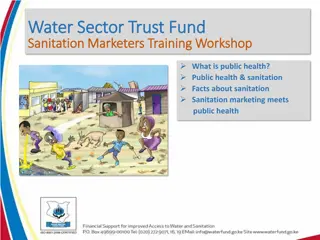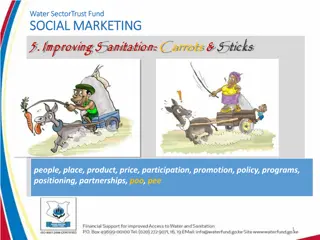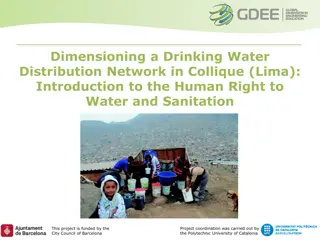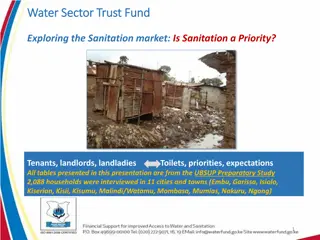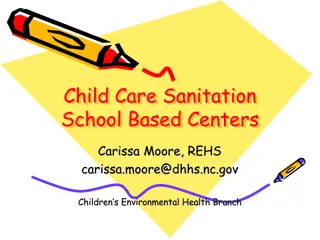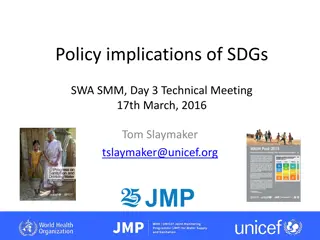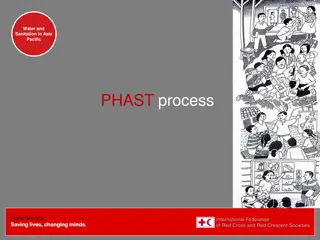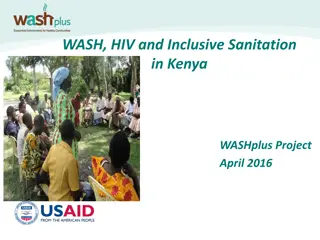Leveraging Finance Intermediaries for Sanitation Sector Growth
USAID's Water, Sanitation, and Hygiene Finance 2 (WASH-FIN 2) aims to mobilize $375 million by 2027 for climate-resilient water and sanitation services in Kenya, India, and Ghana. The project focuses on strengthening governance, improving service provider performance, and expanding partnerships. Tec
1 views • 12 slides
Webinar #04: Utilities Driving Citywide Inclusive Sanitation in Zambia
Webinar #04 focuses on the role of commercial utilities in promoting citywide inclusive sanitation in Zambia. The event aims to facilitate knowledge exchange among water operators in Africa to enhance urban sanitation access. The agenda includes case studies from Luapula and Lukanga, guided discussi
0 views • 56 slides
Progress on Global Monitoring of Safely Managed Sanitation Services
Presentation on the progress of safely managed sanitation services globally, highlighting the off-track status towards meeting SDG targets. It covers the distribution of on-site and sewered sanitation, wastewater treatment, and challenges in safe management. The project includes pilots in Bangladesh
2 views • 18 slides
Challenges in Sol Plaatje Local Municipality Water and Wastewater Management
Sol Plaatje Local Municipality is facing significant challenges with water and wastewater management, including sewer leaks, poor infrastructure maintenance, and environmental concerns. The Department of Water and Sanitation is working to address issues such as sewer spillages, water quality testing
0 views • 22 slides
Advocating for Water Rights and Dignity of Slum Dwellers in Zimbabwe
Khumbulani Maphosa, a PhD Candidate and MIHR Director, is championing the rights to water, sanitation, housing, and a safe environment for slum dwellers in Zimbabwe. Despite the illegal status of slum settlements in Zimbabwean policies, the constitution recognizes basic rights like clean water and h
2 views • 7 slides
AWSISA Introduction to Water Services Authorities Summit
AWSISA aims to support water and sanitation institutions in South Africa by providing advisory services, fostering partnerships, and promoting innovation. The association seeks collaboration with Water Service Authorities in areas such as water demand management, performance monitoring, and water qu
4 views • 11 slides
Smart and Targeted Sanitation Subsidies for Inclusive Market Systems
This research explores the effectiveness of targeted sanitation subsidies in improving access to sanitation facilities for poor households in Cambodia and Ethiopia. It addresses the challenges of sustainability and inclusivity in market-based sanitation approaches, highlighting the controversy surro
2 views • 21 slides
EMBE WATER AND SANITATION CO. LTD. 9TH ANNUAL GENERAL MEETING HIGHLIGHTS
EMBE WATER AND SANITATION CO. LTD. recently held its 9th Annual General Meeting to discuss the company's performance, challenges, and future plans. Key areas of focus included reducing non-revenue water, improving hours of supply, managing personnel expenses, and expanding water coverage. The event
0 views • 14 slides
Integrating Sanitation and Handwashing into PEPFAR Programming
Why Wash matters for PLHIV due to the significant impact of diarrhea on individuals living with HIV/AIDS, affecting absorption of antiretrovirals and nutrients, causing burden on caregivers, and reducing quality of life. Critical WASH behaviors like safe feces disposal, water treatment, and handwash
0 views • 13 slides
Polokwane Water and Sanitation Overview: Improving Water Services for Municipality
Detailed presentation on Polokwane's water and sanitation services, highlighting the municipality's focus on water provision. It covers the strategic vision, challenges faced in urban and rural areas, projected growth in households, and the scheme areas for water services. The integrated water maste
0 views • 17 slides
Enhancing Water and Sanitation Services Delivery in South Africa
The Minister of Water and Sanitation in South Africa, Senzo Mchunu, is leading efforts to improve water and sanitation services delivery. The focus is on strategic priorities such as infrastructure development, regulatory interventions, combating corruption, and enhancing efficiency in the water sec
1 views • 10 slides
Sanitation Challenges and Solutions in Kenya
Sanitation in Kenya faces significant challenges, with only about 31% of households having overall access. The Water Supply and Sanitation Collaborative Council defines sanitation as the management of human excreta, wastewater, and solid waste, along with hygiene promotion. The Sanitation Value Chai
0 views • 9 slides
Baglung Nagar Water Supply and Sanitation Project Overview
The Baglung Nagar Water Supply and Sanitation Project aims to upgrade the existing water supply system in Baglung urban area by adding new water sources, expanding the distribution system, and fulfilling the water demand of the growing population. With a focus on sustainability and efficiency, the p
0 views • 17 slides
Uganda's Sanitation and Hygiene Situation: Challenges and Progress
Uganda's current sanitation profile highlights key issues and initiatives to improve access to safe water, sanitation, and hygiene. Challenges such as low latrine coverage, open defecation rates, and poor handwashing practices persist, but national and district-level strategies are in place to addre
0 views • 8 slides
Social Marketing Strategies for Water Sector Trust Fund and UBSUP
Implementing social marketing strategies for water sanitation programs targeting specific groups like householders, landlords, tenants, women, and children. Key messages focus on sanitation rights, benefits of improved sanitation, toilet usage, handwashing, and waste management. Activities include c
0 views • 5 slides
Understanding New Urban Sanitation Technologies and Systems in Kenya
Explore the comprehensive training sessions and innovative technologies introduced for water sector reform in Kenya, focusing on urban sanitation systems. Gain insights into wastewater management, functional groups, sanitation value chain, and user interface, essential for sustainable sanitation sol
5 views • 25 slides
Tana Water Works Development Agency (TWWDA): Mandate and Interventions in Water Act 2016
TWWDA, established under the Water Act 2016, covers Embu, Kirinyaga, Meru, Nyeri, and Tharaka Nithi counties and serves over 3.9 million people. Its mandate includes managing water works, providing water services, and offering technical support. The agency intervenes in water and sanitation services
0 views • 11 slides
Strategies for Managing Rural Water Supply and Sanitation Agency (RUWASA) Towards Its Highest Intent
RUWASA, established under the Water Supply and Sanitation Act, has core responsibilities in rural water supply and sanitation projects. Strategies for managing RUWASA focus on achieving its highest intent through functions like planning, construction supervision, and community support. The Director
0 views • 10 slides
Improving Water Quality, Sanitation, and Hygiene in Pandemics
This topic discusses the importance of Water, Sanitation, and Hygiene (WASH) in preventing emerging pandemics, emphasizing the One Health approach. Learners will explore WASH principles for disease control, gender roles in pandemic response, and how to utilize the One Health approach to address WASH
0 views • 32 slides
The Global Water Crisis and Transboundary Issues in Southern Africa
The global water crisis is a pressing issue affecting millions worldwide, with about 700 million people currently living below the water-stress threshold. By 2025, this number is projected to reach 3 billion. The increasing pressure on shared water resources in countries like Botswana, Namibia, and
0 views • 52 slides
Rural Sanitation and Wastewater Management Practices
Rural sanitation plays a crucial role in maintaining sanitary conditions in villages and small towns, where more than 70% of the population resides in India. The implementation of proper waste disposal facilities, such as pit privies and eco-sanitation systems, is essential to prevent the spread of
0 views • 61 slides
Overview of GLAAS and TrackFin in Relation to SDGs & Monitoring Initiatives
GLAAS and TrackFin play crucial roles in aligning with SDGs, particularly focusing on water and sanitation targets. The 2030 Agenda emphasizes the importance of sustainable development through various global indicators and targets, such as access to basic services, universal health coverage, and mit
2 views • 22 slides
Understanding Sanitation: Promoting Health Through Proper Waste Management
Sanitation is essential for promoting health by preventing human contact with hazardous wastes and ensuring proper waste treatment and disposal. Hygienic practices, treatment facilities, and personal hygiene all play vital roles in maintaining sanitation. The World Health Organization defines sanita
1 views • 26 slides
Karnataka Rural Water Supply & Sanitation Project Overview
The Karnataka Rural Water Supply & Sanitation Project, assisted by the World Bank, focuses on enhancing water supply, sanitation facilities, and community empowerment in rural areas. The project involves components like water quality tests, household toilets, and women empowerment activities. Throug
0 views • 19 slides
Enhancing Integrity in Water Services Trust Fund for Improved Access to Water and Sanitation
Explore the importance of integrity and ethics in the Water Services Trust Fund for enhancing access to water and sanitation. Delve into concepts of integrity, ethics, and the detrimental effects of corruption. Learn from historical philosophers on virtue and wisdom and how they relate to ethical co
0 views • 13 slides
Comprehensive Overview of GLAAS, SDG Monitoring, and Goal 6 Indicators
The content delves into the Global Analysis and Assessment of Sanitation and Drinking-Water (GLAAS), its relationship with the Sustainable Development Goals (SDGs), particularly Goal 6 on clean water and sanitation. It discusses regional monitoring initiatives, the 2030 Agenda for Sustainable Develo
0 views • 16 slides
Enhancing Water Conservation and Demand Management in South Africa
The National Water Resources Strategy Third Edition (NWRS-3) focuses on reducing water demand in South Africa by implementing effective water conservation and demand management measures across various sectors. Challenges include inadequate planning, lack of funding, and weak enforcement tools. Secto
1 views • 20 slides
Urban Poor Sanitation Design Technical Drawings and Planning View
Ensuring basic sanitation for urban poor, this project involves designing and planning technical drawings with a focus on upscaling basic sanitation facilities. The content provides insight into the context of the session, potential DTF layouts, considerations during layout preparation, and baseline
0 views • 17 slides
Decent Housing Project for Improved Water Supply and Sustainable Sanitation
Towards enhancing urban water supply, sustainable sanitation, and energy use for decent housing, the project led by Jacob Kihila and Patrick Willems aims to address challenges such as solid waste management, water access, and space utilization. With a focus on research and societal engagement, the p
0 views • 12 slides
Understanding Sanitation Options for Efficient Waste Management
Sanitation goes beyond just toilets and encompasses a complete waste management system involving storage, collection, transport, treatment, and reuse. Various technical options are available, such as double vault urine diversion toilets (UDDTs) and water-based toilets. Pros and cons exist for each o
0 views • 12 slides
Debate on Shared Sanitation: Improved or Not?
The discussion revolves around the classification of shared sanitation as improved or unimproved. WHO and UNICEF have a classification system where shared sanitation is considered unimproved due to concerns about cleanliness and accessibility. A proposed policy change by JMP seeks to include shared
0 views • 22 slides
Target Areas for Sanitation Marketers Training in Urban Low-Income Areas
Target areas for sanitation marketers training in urban low-income areas include informal settlements, planned urban areas with low-income housing, informal housing in planned residential areas, urban IDP settlements, and urban sub-centers. These areas present challenges with water supply and sanita
0 views • 18 slides
Importance of Sanitation in Public Health Promotion
Public health interventions focus on improving health and quality of life by preventing and treating diseases, promoting healthy behaviors, and addressing sanitation issues. Lack of clean water and proper sanitation can lead to the spread of various diseases, highlighting the crucial link between sa
0 views • 8 slides
SafiSan Toilets Initiative for Improved Sanitation Practices
The SafiSan toilets initiative focuses on promoting improved sanitation practices through a combination of incentives and regulations. The project emphasizes access to adequate sanitation as a human right and highlights the benefits of utilizing SafiSan toilets, which are affordable, user-friendly,
0 views • 10 slides
Global Dimension in Engineering Education: Water Project in Collique, Lima
Introduction to the Human Right to Water and Sanitation project in Collique, Lima, led by the Polytechnic University of Catalonia and funded by the City Council of Barcelona. The project emphasizes the importance of water, sanitation, and hygiene in global development, highlighting the UN's recognit
0 views • 22 slides
Exploring Sanitation Priorities and Investments: Insights from UBSUP Preparatory Study
The presentation discusses sanitation issues and priorities based on a survey of 2,088 households in 11 cities and towns. It highlights problems related to sanitation, residents' opinions on the need for improvement, types of toilets used, and investment plans in sanitation infrastructure.
0 views • 12 slides
School-Based Centers Sanitation Inspection Protocol
School-Based Centers follow a sanitation inspection protocol that includes areas of concern such as lead hazards, restrooms, flow of children, hot water concerns, bulk food storage, and privacy issues with special needs children. The inspection also involves reviewing designated floor plans to ensur
0 views • 24 slides
Policy Implications of Goal 6: Sustainable Water and Sanitation Management
The Sustainable Development Goals (SDGs) emphasize the importance of ensuring availability and sustainable management of water and sanitation for all. Goal 6 specifically focuses on achieving universal access to safe drinking water and adequate sanitation by 2030. Member states are urged to set nati
0 views • 25 slides
Water and Sanitation in Asia Pacific: Community Planning for Health Improvement
The article discusses the PHAST process (Participatory Hygiene and Sanitation Transformation) in Asia Pacific, focusing on seven steps for community planning to prevent diarrhoeal diseases. It covers problem identification, analysis, planning for solutions, selecting options, monitoring, evaluation,
0 views • 19 slides
Innovative Approaches to WASH and Inclusive Sanitation in Kenya
The WASHplus Project in Kenya has introduced innovative approaches to WASH and inclusive sanitation, focusing on Small Doable Actions (SDAs), Capacity Building, Menstrual Hygiene Management, Sanitation Uptake through CLTSplus, and promoting Inclusive Sanitation. Through training, collaboration with
0 views • 16 slides

